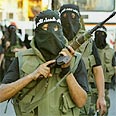
Palestinian street ruled by armed gangs
Photo: Reuters
Should the lull in Palestinian-Israeli violence end (although it’s difficult to refer to a situation where an Israeli is shot almost daily as a “truce,”) Israel would not bear direct responsiblity this time around.
As opposed to some previous occasions where calm was taking root in the past five years, this time Israel made sure to maintain as much restraint as possible.
Targeted killings were halted, while arrests and counter-terror operations were limited as much as was possible to genuine “ticking bombs” about to carry out attacks.
The blame for the relative lull’s expected collapse lies somewhere else entirely this time, yet Israel still played a significant historic role in it, namely, the complete disintegration of the Palestinian Authority as a force able to maintain some kind of control on the ground.
Palestinian security apparatuses were torn between several contradictory forces during the years of fighting. For one thing, the Palestinian street demanded they join the struggle against Israel, and many uniform wearers did just that on a “private” basis.”
Israel, on the other hand, regularly attacked the Palestinian Authority in the first phase of fighting, due to a desire to send a “message” that would force the PA to act. Later, every Palestinian uniform became an enemy.
As a result of this dual pressure, most Palestinian security apparatuses lost most of their strength. “Their military officers were lost, and it would take a long time for them to rebuild their power,” a senior army officer said months ago.
Someone in the Shin Bet, meanwhile, was talking about years needed for recovery.
Israel’s constraint worth little
Names such as Palestinian strongmen Jibril Rajoub and Mohammed Dahlan were raised again in recent months, but we are talking about an empty shell compared to the power they possessed before September 2000.
In 1996, Dahlan’s men shaved the beards of Hamas members. Rajoub, meanwhile, was powerful enough to prevent most of his people from taking part in staging terror attacks on Israel in the first year of the confrontation.
This kind of power is very remote today.
A large part of the Palestinian street is ruled by gangs adorned by names such as the “al-Aqsa Brigades,” which are in fact nothing but a collection of local interests.
Under such conditions, Israel’s gestures and restraint are worth very little.
What prevents the situation from exploding is Israel’s interest on one hand, and the Hamas’ interest on the other, to see the disengagement implemented.
Meanwhile, Hamas has remained the most organized body among armed factions in the Palestinian Authority jungle.
However, this reality too is difficult to preserve. After all, every local pressure, such as the annulment of election results at some local municipalities, pushes the group closer to breaking point.
And thus, Israel is facing a particularly complex situation, which has not yet exploded because of one reason – the foiling of large-scale terror attacks















